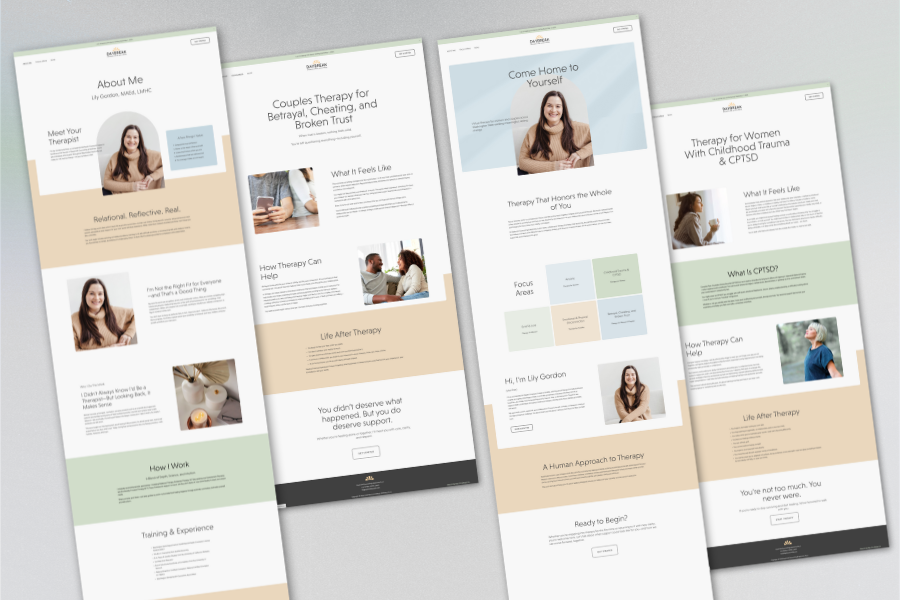6 Simple Niche Alternatives for Therapists
Does the thought of a niche or specialization make you cringe? I know a lot of therapists and coaches don't want to feel limited by a narrow focus area. In addition, some don't feel ready to specialize just yet.
Typically, we think of a niche as a specific or specialized:
Approach (Art therapy, ACT, DBT, EMDR, Coaching, etc.)
Population (Women, Divorcees, Children, Creatives, etc.)
Problem Area (Diagnoses or disorders, grief, marital discord, etc.)
There's a lot of debate regarding whether a niche or specialization will help our business. It certainly doesn't make sense to do it if it's coming from a place of uncertainty and inauthenticity.
I don't think a niche needs to fit neatly into one of the categories above, but it makes more sense to use one from a marketing standpoint. Clients often focus on these three areas when searching for a therapist online. When typing into the Google search bar, they use keywords like "Art Therapy," "Therapy for BIPOC," or "Counseling for PTSD."
If you don't want to focus on one of the categories above, there are other ways to stand out online. It might be tricky to optimize your website for search engines, but that doesn't mean it can't be done.
I've compiled a list of 6 ways to stand out online without a niche.
#1: Tell your story
This is my favorite strategy. You don't need a niche if you can compellingly tell your story. You'll attract people who relate to your journey.
Before you try this, research how to tell a great story. This was a big focus for me as I made the About page of my private practice website.
#2: Do Great Work
One of the reasons we cling to the idea of a niche is that we think it will make us look like we're good at what we do. There is no substitute for doing great work.
But perhaps you'd rather be a small fish in a big pond than the other way around. Because one day, you could become a big fish in a big pond. To do that, you'll need to show up consistently, practice deliberately, and master your craft.
#3: Develop High-Quality Content
Posting strategic content, monitoring your social media channels, and engaging with your audience with help you develop a reputation amongst your followers. You might also focus on putting your business on review sites, directories, or apps. Using these platforms helps you positively shape the consumer perception of your brand or business.
#4: Nurture Relationships
My friend Kathryn is a gold star networker. She had developed so many connections throughout her career that all those colleagues were eager to send her clients when she started her coaching practice - without knowing anything about her coaching practice. They knew Kathryn and that was enough for them.
It's easy for people to forget about you, so commit to actually nurture those relationships. This means staying engaged with them over the long term. You can do this by sending a note in the mail, meeting for coffee a few times a year, or sending them business.
#5: Develop a Strong Voice
It's hard to stand out if you sound like everyone else. When I started blogging, I had a very academic-sounding voice. Most of us do because we spend a lot of our early lives in school. The problem with academic writing is that it's often dull, complex, and overly formal. Instead, people want to get a sense of your personality. Mark Manson is an excellent example of someone with a strong voice.
#6: Stop Trying to Fit into a Box
Therapists often struggle with their "elevator pitch." Some jobs are easy to describe. You can say, "I'm a preschool teacher," or "I'm a dentist." However, when you're a therapist or coach, you must find more ways to describe what you do. For example, most people don't understand therapy, and they may have a stigma around it. So instead of saying, "I'm a therapist," I say: "I help people cope with life-altering medical conditions." It's an unusual response, but it usually sparks an interesting conversation.
All of the above points are especially effective when you are the brand instead of a product or service being the brand. There is nothing else to hide behind: it's just you.
Don't make things more complicated than they have to be. Over time, your niche will get more precise. You will start to attract a specific type of person, narrowing your focus then.






























